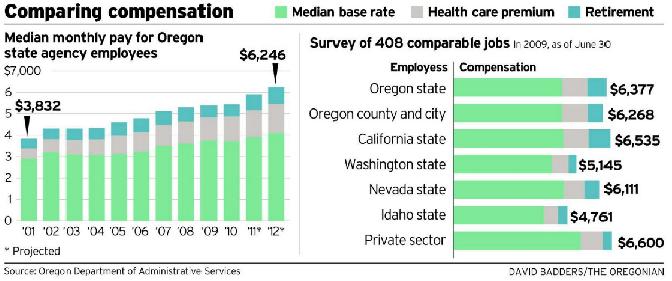![]() A Note on Public Sector Worker Pay
A Note on Public Sector Worker Pay
By Patrick Emerson
Oregon Economics Blog
.
.

I have no beef with Ted Sickinger’s nice piece on compensation for public and private workers. He does as good a job as one could ask for in trying to make sense of the issue, and I especially like how the article emphasizes the entire compensation package, not just salary. For me, the generous benefits helped to make up for the fact that the pay I accepted was far below competing offers from places in California, Ohio and North Carolina. [But they suck and Oregon is sweet!] I also really like the fact that he brought up education and job skills as they are very important considerations in any discussion of pay.
But if one were to really want to get to the bottom of the question of whether Oregon’s public workers are overcompensated you would have to do more than compare averages across states and across private and public sectors. You would need to be able to say something about productivity – are we getting as much bang for our buck as other states and the private sector. As productivity is generally positively related to education, experience and job tenure, that would be a good place to start. If you have data on individual workers you could control for these individual characteristics and then get a much clearer idea of where relative pay stands. Even better, of course, would be an actual measure of productivity, but as we are talking about a vast array of jobs, doing so would be too difficult.
In the end, Sickinger’s piece gives a nice bit of background information, but still leaves us essentially clueless about the question of whether public sector workers are overpaid or underpaid. Though it may not matter that much given the amount of cutting the state is going to be forced to do. Still, lawmakers should be aware of efficiency wages: you may cut so much that productivity per dollar actually drops.
My guess as an economist is based in the belief that the public sector has to compete for the same workers as the private sector and so, in equilibrium, productivity weighted compensation should end up roughly equal. Pay too little and you will see that workers keep leaving for better paying jobs. Pay too much and you will have a hard time showing how well you have managed your money as a boss. In the end, I doubt there is much difference.
Disclaimer: Articles featured on Oregon Report are the creation, responsibility and opinion of the authoring individual or organization which is featured at the top of every article.

